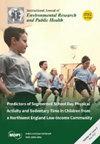牙周炎对未确诊慢性疾病的成年人体型表型的影响:2013-2015年韩国国民健康与营养调查
3区 综合性期刊
Q1 Medicine
International Journal of Environmental Research and Public Health
Pub Date : 2024-09-04
DOI:10.3390/ijerph21091180
引用次数: 0
摘要
我们旨在研究牙周炎与体型表型之间的相关性,研究对象是韩国 2013-2015 年国民健康与营养调查中的 7301 名未确诊慢性疾病的参与者。根据体重指数和是否患有代谢综合征,参与者被分为以下体型表型组:代谢健康正常体重组(MHNW)、代谢异常正常体重组(MANW)、代谢健康肥胖组(MHO)和代谢异常肥胖组(MAO)。轻度和重度牙周炎的发病率分别为 18.1%和 7.5%。牙周炎患者年龄较大,目前吸烟,家庭收入较低,不太可能定期刷牙或锻炼,体重指数和血糖水平较高。牙周炎在男性和女性组及 MAO 组的发病率高于男性和女性组及 MHO 组。与 MHNW 表型相比,MAO 和 MANW 表型与轻度和重度牙周炎显著相关,而 MHO 表型与轻度牙周炎显著相关。MANW和MAO表型是未确诊慢性疾病的成年人患牙周炎的独立风险因素。为了提高公共卫生水平,在牙周病患者中识别代谢疾病表型的重点和有效方法可能与临床相关。本文章由计算机程序翻译,如有差异,请以英文原文为准。
The Effect of Periodontitis on Body Size Phenotypes in Adults without Diagnosed Chronic Diseases: The Korean National Health and Nutrition Examination Survey 2013–2015
We aimed to examine the correlation between periodontitis and body size phenotypes in 7301 participants without diagnosed chronic diseases in the Korean National Health and Nutrition Examination Survey 2013–2015. The participants were categorized into the following body size phenotype groups based on body mass index and the presence of metabolic syndrome: metabolically healthy normal weight (MHNW), metabolically abnormal normal weight (MANW), metabolically healthy obese (MHO), and metabolically abnormal obese (MAO). The prevalence rates of mild and severe periodontitis were 18.1% and 7.5%, respectively. Patients with periodontitis were older, current smokers, had a lower family income, were less likely to engage in regular tooth brushing or exercise, and had a higher body mass index and glucose levels. Periodontitis was more prevalent in the MANW and MAO groups than in the MHNW and MHO groups. Compared with the MHNW phenotype, the MAO and MANW phenotypes were significantly associated with mild and severe periodontitis, and the MHO phenotype was significantly associated with mild periodontitis. The MANW and MAO phenotypes are independent risk factors for periodontitis in adults without diagnosed chronic diseases. To enhance public health, a greater focus and effective approaches for identifying metabolic disease phenotypes among individuals with periodontal disease may be clinically relevant.
求助全文
通过发布文献求助,成功后即可免费获取论文全文。
去求助
来源期刊

International Journal of Environmental Research and Public Health
Medicine-Public Health, Environmental and Occupational Health
CiteScore
7.30
自引率
0.00%
发文量
14422
审稿时长
1 months
期刊介绍:
International Journal of Environmental Research and Public Health (IJERPH) (ISSN 1660-4601) is a peer-reviewed scientific journal that publishes original articles, critical reviews, research notes, and short communications in the interdisciplinary area of environmental health sciences and public health. It links several scientific disciplines including biology, biochemistry, biotechnology, cellular and molecular biology, chemistry, computer science, ecology, engineering, epidemiology, genetics, immunology, microbiology, oncology, pathology, pharmacology, and toxicology, in an integrated fashion, to address critical issues related to environmental quality and public health. Therefore, IJERPH focuses on the publication of scientific and technical information on the impacts of natural phenomena and anthropogenic factors on the quality of our environment, the interrelationships between environmental health and the quality of life, as well as the socio-cultural, political, economic, and legal considerations related to environmental stewardship and public health.
The 2018 IJERPH Outstanding Reviewer Award has been launched! This award acknowledge those who have generously dedicated their time to review manuscripts submitted to IJERPH. See full details at http://www.mdpi.com/journal/ijerph/awards.
 求助内容:
求助内容: 应助结果提醒方式:
应助结果提醒方式:


